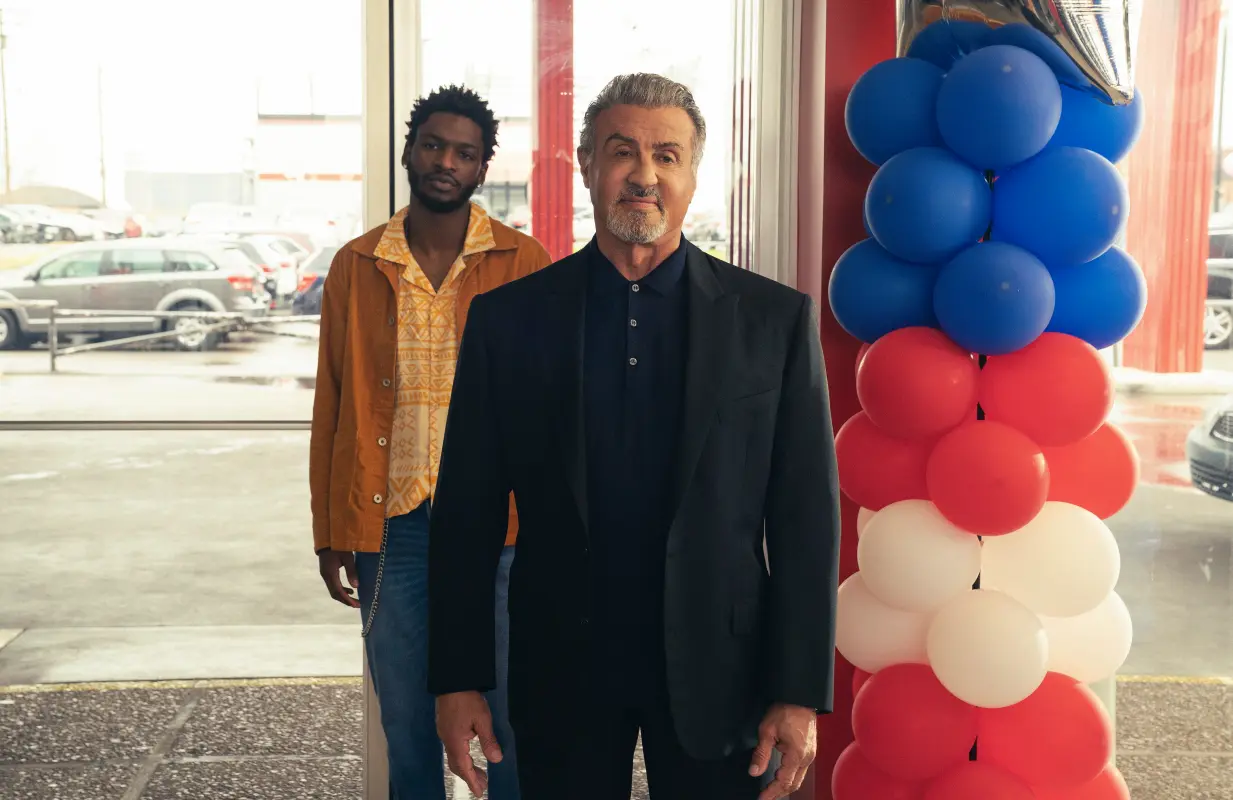Sylvester Stallone Can’t Do a Thing With Taylor Sheridan’s Tulsa King
-
 Jay Will and Sylvester Stallone in Tulsa King (Photo: Brian Douglas/Paramount+)
Jay Will and Sylvester Stallone in Tulsa King (Photo: Brian Douglas/Paramount+)We typically discuss world-building in sci-fi and fantasy, but it's essential in any genre. That's as true for Breaking Bad's violent, quirky take on Albuquerque as it is for The Wire's gritty, heartfelt Baltimore, so when a show puts its setting right there in the title — say, the new Paramount+ series Tulsa King — viewers should expect to visit a particular place with a particular point of view.
Not this time, though. That's a shame, since series creator Taylor Sheridan typically makes the setting a vital part of his material, from Yellowstone’s imposing Montana landscape to the sun-scorched Texas fields in Hell or High Water. But while it’s ostensibly based in Oklahoma, where Mafia capo Dwight Manfredi (Sylvester Stallone) is sent to establish a new crime empire after serving 25 years in jail, Tulsa King could take place anywhere. There’s no sense of what Tulsa is, no rooted observations about its particular culture beyond an intro that finds Mandredi banished to this apparent wasteland of cow pastures and cowboy hats. Add in the stomping, unctuous score, with its slide guitar and string swells, and the show feels more like an expensive ad for a pickup truck than an exploration of a community.
Manfredi himself certainly doesn’t care about the town, but that makes sense, since he’s been ordered to go there by his bosses. It’s more telling that when he arrives at the airport, he immediately meets Tyson (Jay Will), a cab driver who’s equally disenchanted. When Manfredi asks why Oklahoma is called the Sooner state, Jay says, “Because of the football team, and the town’s history, or some shit.”
This bored exchange is typical: Tulsa King tells more than it shows, and doesn’t tell it with any particular flair. That might be less annoying if Stallone were a more compelling lead. The man's capacity for stony, thousand-yard stares and reluctant smiles is legendary, but here, his one-note take on a New York mafioso plays like a cartoonish stereotype. Manfredi vacillates between crude humor – comparing a giant grasshopper to the size of his own endowment – and occasional chivalry that’s supposed to cast him as an old-school gentleman.
The script additionally wants us to believe that Manfredi is curious and gregarious, but also a gruff jerk, but also a businessman. There’s a tender core surrounded by scars, you see. Stallone has neither the range nor the gravitas to portray this mix of traits, emotionally disconnecting when he should be passionate, then getting in people’s faces with no credible run-up.
Similarly, Sheridan’s themes unfurl like charmless bullet points: an insecure male ensemble led by a virile, aging authority figure; rural culture on the skids; shocking everyday violence; and a familial criminal enterprise.
Then there’s the so-called comedy of watching Manfredi try to re-enter society. He’s befuddled by newfangled inventions like smartphones, electric scooters and, uh, credit cards. We’re supposed to find this amusing, just like we’re supposed to chuckle as Manfredi instantly becomes a fish out of water, falling back on his wiseguy instincts to beat people up and throw cash around. However, since the townspeople just give him quizzical looks instead of, say, calling the cops, everything plays like a forced setup for a gag.
That heavy-handedness extends to characters like a used-car salesman who gets his comeuppance for denying Tyson, a Black man, a car that Manfredi wants to buy. Soon after putting a fist in the man’s stomach, Manfredi also brutally gut-punches a drunken cowboy who’s harassing a woman dancing at a club. No one notices except for another woman that he immediately ends up bedding. It’s Sopranos-lite wish fulfillment, and it does a particular disservice to Will, whose performance makes Tyson a likable and lively presence that injects some electricity into the show.
What a waste for a series to be this incurious about its setting and characters. Tulsa King has the potential to delve into the rural and urban divides, gray-area drug markets, and dying 20th-century legacies that are currently roiling this country. Unfortunately, it’s nearly impossible to see anything new when you’re traveling on autopilot.
Tulsa King premieres November 13 on Paramount+.
People are talking about Tulsa King in our forums. Join the conversation.
John Wenzel is an arts reporter and critic for The Denver Post who has written for Rolling Stone, Esquire, The Atlantic and Vulture. He grew up in Dayton, Ohio, worshipping Guided by Voices and The Breeders, and has a hobbit garden in his front yard.
TOPICS: Tulsa King, Paramount+, Jay Will, Sylvester Stallone, Taylor Sheridan